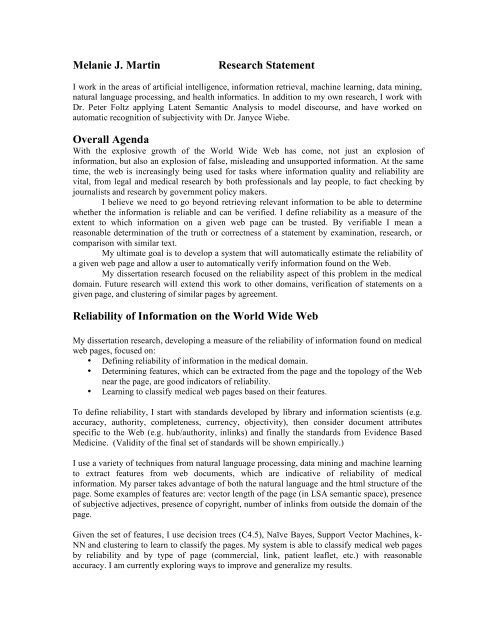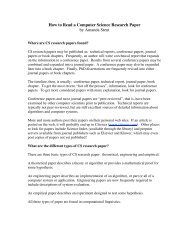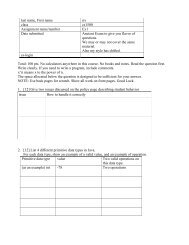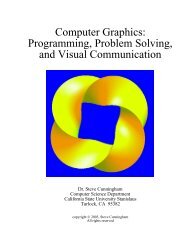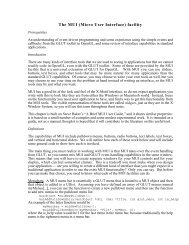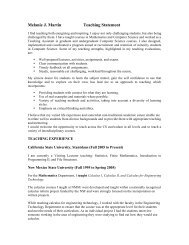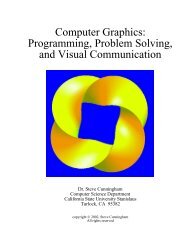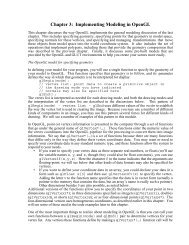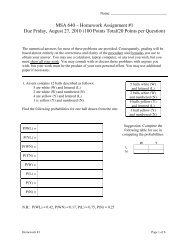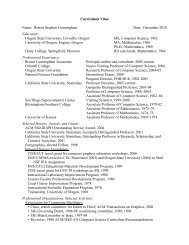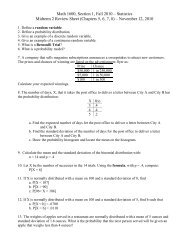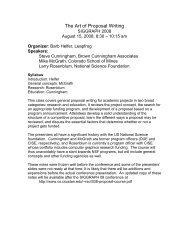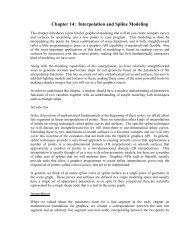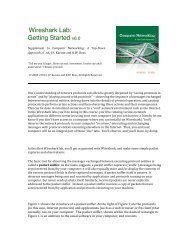Melanie J. Martin Research Statement Overall Agenda Reliability of ...
Melanie J. Martin Research Statement Overall Agenda Reliability of ...
Melanie J. Martin Research Statement Overall Agenda Reliability of ...
You also want an ePaper? Increase the reach of your titles
YUMPU automatically turns print PDFs into web optimized ePapers that Google loves.
<strong>Melanie</strong> J. <strong>Martin</strong><br />
<strong>Research</strong> <strong>Statement</strong><br />
I work in the areas <strong>of</strong> artificial intelligence, information retrieval, machine learning, data mining,<br />
natural language processing, and health informatics. In addition to my own research, I work with<br />
Dr. Peter Foltz applying Latent Semantic Analysis to model discourse, and have worked on<br />
automatic recognition <strong>of</strong> subjectivity with Dr. Janyce Wiebe.<br />
<strong>Overall</strong> <strong>Agenda</strong><br />
With the explosive growth <strong>of</strong> the World Wide Web has come, not just an explosion <strong>of</strong><br />
information, but also an explosion <strong>of</strong> false, misleading and unsupported information. At the same<br />
time, the web is increasingly being used for tasks where information quality and reliability are<br />
vital, from legal and medical research by both pr<strong>of</strong>essionals and lay people, to fact checking by<br />
journalists and research by government policy makers.<br />
I believe we need to go beyond retrieving relevant information to be able to determine<br />
whether the information is reliable and can be verified. I define reliability as a measure <strong>of</strong> the<br />
extent to which information on a given web page can be trusted. By verifiable I mean a<br />
reasonable determination <strong>of</strong> the truth or correctness <strong>of</strong> a statement by examination, research, or<br />
comparison with similar text.<br />
My ultimate goal is to develop a system that will automatically estimate the reliability <strong>of</strong><br />
a given web page and allow a user to automatically verify information found on the Web.<br />
My dissertation research focused on the reliability aspect <strong>of</strong> this problem in the medical<br />
domain. Future research will extend this work to other domains, verification <strong>of</strong> statements on a<br />
given page, and clustering <strong>of</strong> similar pages by agreement.<br />
<strong>Reliability</strong> <strong>of</strong> Information on the World Wide Web<br />
My dissertation research, developing a measure <strong>of</strong> the reliability <strong>of</strong> information found on medical<br />
web pages, focused on:<br />
• Defining reliability <strong>of</strong> information in the medical domain.<br />
• Determining features, which can be extracted from the page and the topology <strong>of</strong> the Web<br />
near the page, are good indicators <strong>of</strong> reliability.<br />
• Learning to classify medical web pages based on their features.<br />
To define reliability, I start with standards developed by library and information scientists (e.g.<br />
accuracy, authority, completeness, currency, objectivity), then consider document attributes<br />
specific to the Web (e.g. hub/authority, inlinks) and finally the standards from Evidence Based<br />
Medicine. (Validity <strong>of</strong> the final set <strong>of</strong> standards will be shown empirically.)<br />
I use a variety <strong>of</strong> techniques from natural language processing, data mining and machine learning<br />
to extract features from web documents, which are indicative <strong>of</strong> reliability <strong>of</strong> medical<br />
information. My parser takes advantage <strong>of</strong> both the natural language and the html structure <strong>of</strong> the<br />
page. Some examples <strong>of</strong> features are: vector length <strong>of</strong> the page (in LSA semantic space), presence<br />
<strong>of</strong> subjective adjectives, presence <strong>of</strong> copyright, number <strong>of</strong> inlinks from outside the domain <strong>of</strong> the<br />
page.<br />
Given the set <strong>of</strong> features, I use decision trees (C4.5), Naïve Bayes, Support Vector Machines, k-<br />
NN and clustering to learn to classify the pages. My system is able to classify medical web pages<br />
by reliability and by type <strong>of</strong> page (commercial, link, patient leaflet, etc.) with reasonable<br />
accuracy. I am currently exploring ways to improve and generalize my results.
Other <strong>Research</strong> Projects<br />
Discourse Modeling with Latent Semantic Analysis (LSA): work with Dr. Peter Foltz<br />
(Computing <strong>Research</strong> Laboratory)<br />
From January 2002 to present, I have worked for Dr. Peter Foltz, and as part <strong>of</strong> a research group<br />
with co-PIs, Dr. Foltz and Dr. Nancy Cooke at Arizona State East, funded by grants from ARL<br />
and ONR. My work with Dr. Foltz is on automatic discourse analysis in the teamcommunication<br />
domain. The ultimate goal is to have a real-time system that analyses the team<br />
discourse and provides feedback to team members and trainers or supervisors so that team<br />
performance can be improved on critical tasks.<br />
My work has primarily centered on automatically discourse tagging using a predefined tag-set<br />
developed to categorized content <strong>of</strong> sequential team communication. My basic algorithm takes an<br />
utterance and uses LSA to find the most semantically similar utterances, which have previously<br />
been tagged, and estimates the most probable tag for the current utterance. I have improved the<br />
algorithm by adding some superficial syntactic features. We are in the process <strong>of</strong> investigating the<br />
correlation <strong>of</strong> tag counts and counts <strong>of</strong> tag sequences (e.g. bigrams) to overall team performance.<br />
Preliminary results confirm the findings <strong>of</strong> Bowers et al. Results are reported in <strong>Martin</strong> and Foltz<br />
NAACL 2004. A demo <strong>of</strong> this work can be found by clicking the “Discourse Analysis” link on<br />
http://bluff.nmsu.edu/~ahmed/.<br />
In addition I have been involved in the hiring and supervision <strong>of</strong> other research group members. I<br />
bear primary responsibility for ensuring the integrity and consistency <strong>of</strong> the data used in LSA<br />
processing. I am currently supervising a project to annotate additional data.<br />
Automatic Recognition <strong>of</strong> Subjectivity: work with Dr. Janyce Wiebe (University <strong>of</strong><br />
Pittsburgh)<br />
From May 1998 to December 2001, I worked with Dr. Janyce Wiebe and colleagues on projects<br />
aimed at automatically recognizing subjectivity in text. Projects included:<br />
• Topic segmentation<br />
• Ideological point <strong>of</strong> view<br />
• Flame recognition<br />
We used discourse processing techniques from computational linguistics and probabilistic<br />
classification. In probabilistic methods, we investigated probabilistic model search procedures<br />
and methods for representing lexical information as input features to machine learning<br />
algorithms.<br />
My comprehensive exam was on the feasibility <strong>of</strong> developing an automatic system that would,<br />
given a collection <strong>of</strong> text from the Internet about a given topic, segment the text by ideological<br />
point <strong>of</strong> view.<br />
The written portion is available at: http://www.cs.nmsu.edu/~mmartin/courses/comps_all.html<br />
I developed annotation instructions for recognizing flames (hostile or abusive messages) in<br />
Usenet newsgroups and supervised the annotation. Results are reported in Wiebe et al. Sigdial<br />
2001 and Computational Linguistics 2004. I worked with master's students to implement<br />
algorithms for automatic flame detection.


